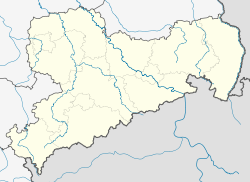Bad Muskau
This article needs additional citations for verification. (June 2017) |
Bad Muskau | |
|---|---|
 Muskau Castle | |
Location of Bad Muskau within Görlitz district  | |
| Coordinates: 51°33′0″N 14°43′0″E / 51.55000°N 14.71667°E | |
| Country | Germany |
| State | Saxony |
| District | Görlitz |
| Municipal assoc. | Bad Muskau |
| Subdivisions | 3 |
| Government | |
| • Mayor | Thomas Krahl (CDU) |
| Area | |
| • Total | 15.35 km2 (5.93 sq mi) |
| Elevation | 110 m (360 ft) |
| Population (2022-12-31)[1] | |
| • Total | 3,759 |
| • Density | 240/km2 (630/sq mi) |
| Time zone | UTC+01:00 (CET) |
| • Summer (DST) | UTC+02:00 (CEST) |
| Postal codes | 02953 |
| Dialling codes | 035771 |
| Vehicle registration | GR, LÖB, NOL, NY, WSW, ZI |
| Website | www.badmuskau.de |
Bad Muskau (German pronunciation: [ˌbaːt ˈmʊskaʊ]; formerly Muskau, Template:Lang-hsb, Template:Lang-pl, Czech: Mužakov) is a spa town in the historic Upper Lusatia region in Germany at the border with Poland. It is part of the Görlitz district in the State of Saxony.
It is located on the Lusatian Neisse, which since 1945 has formed the German-Polish border, directly opposite the town of Łęknica (formerly Lugknitz). The municipality contains the western half of the Muskau Park, a UNESCO World Heritage Site.
The town is part of the recognized Sorbian settlement area in Saxony. Upper Sorbian has an official status next to German, all villages bear names in both languages.
History

Muskau was founded in the 13th century and was first mentioned in 1249. The state country (Standesherrschaft) of Muskau was the largest of the Holy Roman Empire. From 1319 it was part of the Duchy of Jawor, one of Lower Silesian duchies of fragmented Piast-ruled Poland.[2][3] In 1329 it passed to the Bohemian (Czech) Kingdom, where it formed part of the Margraviate of Upper Lusatia, a Bohemian (Czech) Crown Land.[4] In 1452 it was granted town rights.[4] By the 1635 Peace of Prague it passed to the Electorate of Saxony, elevated to the Kingdom of Saxony in 1806. Between 1697 and 1763 it was also under rule of Polish kings in personal union and one of two main routes connecting Warsaw and Dresden ran through the town at that time.[5] Kings Augustus II the Strong and Augustus III of Poland often traveled that route. Part of Upper Lusatia was annexed by Prussia following the 1815 Congress of Vienna and was administered as part of the Province of Silesia.
Up to the beginning of the 19th century Muskau's direct rulers were the Counts of Callenberg, succeeded up to 1845 by Count (later Prince) Hermann von Pückler-Muskau, later on by Prince Wilhelm Friedrich Karl von Oranien-Nassau, and after him by the Counts von Arnim, right up to their flight in April 1945. After World War II it was divided along the Neisse River between East Germany and the Republic of Poland. About two thirds of the park came under Polish administration.
In 1962 Muskau was renamed "Bad Muskau" after a therapeutic bath (spa) was built there. In 1972 the border crossing between East Germany and Poland was opened[4] and visa-free local border traffic was allowed.[6]

Governance
Town twinning
Notable people
- Nathaniel Gottfried Leske (1751–1786), natural scientist and geologist
- Leopold Schefer (1784–1862), writer and composer
- Hermann von Pückler-Muskau (1785–1871), famous landscape gardener and writer, founder of the Park von Muskau
- Gustav Fechner (1801–1887), experimental psychologist
- Eduard Petzold (1815–1891), landscape gardener
- Alwin Schultz (1838-1909), art and cultural historian
- Paul Kraske (1851–1930), surgeon
- Bruno von Mudra (1851-1931), General of Infantry and freeman of Muskau
- Werner Richter (1888-1969), writer
- Erna Pfitzinger (1898–1988), potter
- Karl Peglau (1927-2009), traffic psychologist, inventor of the East German Ampelmännchen for traffic lights
- Olaf Zinke (1966), skater, Olympic gold medalist
In addition, a number of professional hockey players were born in Bad Muskau:
- Ronny Arendt (born 1980)
- Frank Hördler (born 1985)
- Ivonne Schröder (born 1988)
- Elia Ostwald (born 1988)
- Toni Ritter (born 1990)
References
- ^ "Einwohnerzahlen nach Gemeinden als Excel-Arbeitsmappe" (XLS) (in German). Statistisches Landesamt des Freistaates Sachsen. 2024.
- ^ Hermann Knothe, Geschichte des Oberlausitzer Adels und seiner Güter, Breitkopf & Härtel, Leipzig, 1879, p. 567
- ^ Gustav Köhler, Der Bund der Sechsstädte in der Ober-Lausitz: Eine Jubelschrift, G. Heinze & Comp., Görlitz, 1846, p. 11
- ^ a b c "Stadtgeschichte". Stadt Bad Muskau (in German). Retrieved 1 March 2020.
- ^ "Informacja historyczna". Dresden-Warszawa (in Polish). Retrieved 1 March 2020.
- ^ "Grenzstadt". Stadt Bad Muskau (in German). Retrieved 1 March 2020.




